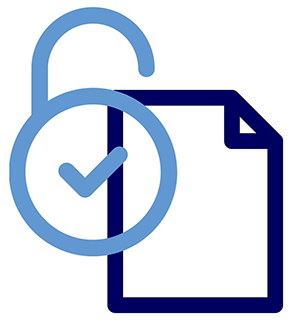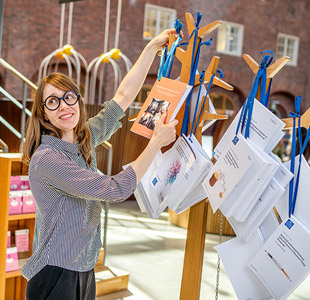Publish your research
Publishing your research involves more than just choosing a journal – it’s about making strategic decisions that affect the visibility, accessibility, and impact of your work. KTH Library offers support throughout the entire publishing process, from selecting the right publication channel to registering in DiVA, KTH’s publication database.
Choose publication channel
The principles for selecting a publication channel involve strategic evaluation of relevance, credibility, visibility, and ethical considerations to ensure research reaches the appropriate audience and maintains academic integrity.
We can provide tips and advice on which journal and publisher an article might be suitable for, with regard to subject area, article type, citation impact, open access, and acceptance rate.
Subject, relevance and audience
The first step is to assess how well a journal’s scope aligns with the research topic, methodology, and target audience.
Ask yourself questions such as:
-
Does the journal’s scope match my subject area and the type of article I am submitting?
-
Do researchers within my field, my institution, or my research group publish in this journal?
Publishing in channels that are used by your own research group increases visibility within the field and aligns with the institution’s publishing traditions.
Visibility and indexing
To maximize discoverability, verify that the journal is indexed in major databases relevant to the field, such as Web of Science, Scopus, or subject-specific indexes (e.g., MEDLINE, Inspec).
Ask yourself questions such as:
-
Is the journal indexed in relevant databases within my field?
-
How quickly after publication do articles become searchable in databases?
-
Are articles from the journal visible in Google Scholar and other open search services?
Academic metrics and reputation
Academic metrics and reputation are often used to assess the impact and visibility of research, for example through citations, journal rankings, and various bibliometric indicators. These metrics can be helpful when choosing a publication channel, but they should be used with caution and always considered in relation to the content of the research, its target audience, and disciplinary traditions.
Ask yourself questions such as:
-
What impact does the journal have compared to others within the same subject area?
-
How reliable and relevant are these metrics within my field?
Open access and funder requirements
According to KTH’s publishing policy, research should be accessible and visible to as many people as possible. Many research funders require research results to be published with open access. Before choosing a journal, it is therefore important to ensure that it offers a legitimate open access option and that the publication complies with your funder’s requirements, for example regarding licences, archiving, and accessibility.
There are several ways to make your text openly accessible. Read more about open access
The author retains copyright unless it is transferred to a publisher or another party. Therefore, carefully read the agreement you receive from the publisher before signing it. Read more about copyright
Checking these aspects in advance reduces the risk of problems later on and helps ensure that your research can be disseminated and used freely.
Ask yourself questions such as:
-
Does the journal offer open access?
-
Have I read and understood the copyright agreement?
-
Is there support or an agreement that covers the article processing charge (APC)?
-
Does the journal or my funder require research data to be shared openly?
Ethical and practical considerations
When choosing a publication channel, it is important to take both ethical and practical aspects of the publishing process into account. By reflecting on issues such as authorship, peer review procedures, and timelines, you can make a more informed choice and reduce the risk of problems during or after publication.
Ask yourself questions such as:
-
Do I and the journal follow ethical guidelines for authorship and publishing (e.g. COPE, CRediT)?
-
What type of peer review is used? How long is the review process, and what is the acceptance rate?
By combining these principles with open science tools, researchers can make informed, ethical, and strategic decisions when selecting publication channels, ensuring their work is visible, credible, and accessible.
Pitfalls to avoid
Predatory journals
Predatory journals are publications that present themselves as scholarly but lack reliable peer review and transparency. They often attract authors with promises of rapid publication, very broad subject scopes, and aggressive email solicitations. Publishing in such journals can harm both a researcher’s credibility and the impact of the research. To avoid them, you should examine the journal’s editorial process, check whether it is indexed in established databases, and be alert to unclear fees or missing contact information. The library can support you in assessing the credibility of journals and help you choose an appropriate publication channel.
Hijacked journals
Hijacked journals are fake or cloned journal websites that steal the identity of legitimate journals — including names, ISSNs, and claimed indexing — in order to sell rapid publication, often via paper mills. According to Retraction Watch, its Hijacked Journal Checker has now surpassed 400 entries , with approximately 70–80 new hijacked journals identified each year, and some clones estimated to generate over one million USD in just a few months. Such journals have managed to place content in databases such as Scopus and even COVID-19 collections, a phenomenon known as indexjacking. This can contaminate citation data, mislead evaluation systems, and spread plagiarism or low-quality research. Researchers at KTH are encouraged to check suspicious journals and URLs using the free Retraction Watch Hijacked Journal Checker and to report new cases via the form .



